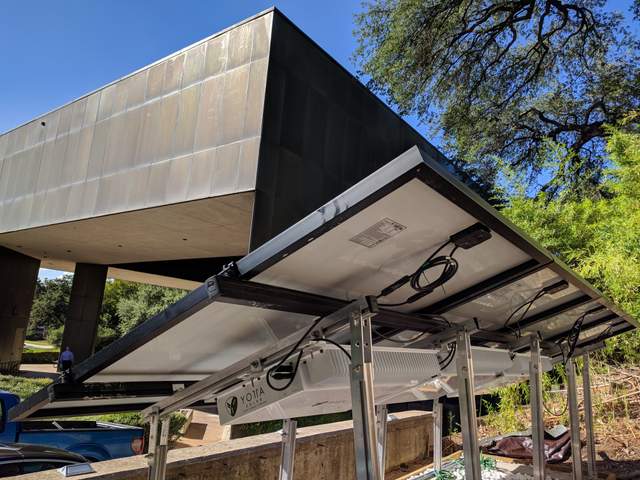
Yotta Solar’s SolarLEAF at the IC2 Building in Austin, Texas.
Yotta Solar, a developer of innovative energy storage systems, is introducing the SolarLEAF at SPI this week (Booth 3869), which uses a 100% passive thermal regulation system for panel-level energy storage. This passive temperature regulation enables the system to operate in extreme temperatures while protecting the battery life and without degrading performance.
Yotta Solar says the plug-and-play design simplifies the integration of energy storage with solar PV and eliminates the need for heavy, difficult to install enclosures, complicated HVAC systems that require parasitic loads, and expensive fire suppression systems.
“For solar power to truly reach its full potential, energy storage has to be an integral part of the equation. We designed the SolarLEAF to make adding energy storage simple for solar developers and utilities by eliminating the design and site-specific complexities that come with centralized storage,” said Omeed Badkoobeh, co-founder & CEO of Yotta Solar.
How does it work?
In a nutshell, the SolarLEAF panel-level energy storage system reduces project and operational costs by eliminating the need for HVAC or fire suppression systems, plus it doesn’t use extra real estate occupied by centralized battery systems in shipping containers.
The patented passive thermal regulation technology shields the battery from both hot and sub-freezing temperatures and results in a long and bankable service life, industry leading combined solar plus storage efficiency, and higher overall solar generation.
The SolarLEAF system is a battery pack with integrated multi-way power flow electronics that easily attaches behind standard 60 to 96 cell solar modules either at the time of panel installation or as a retrofit.
Passive thermal technology
Yotta’s passive thermal regulation is a revolutionary technology that uses very little to zero external power to keep the system’s batteries between 50° F and 95° F (10° – 35° C) in climates, including extreme summer heat and freezing winters. Because the batteries are not aggregated in one central location, SolarLEAF systems have no risk of cascading thermal events and can be installed in locations where centralized large-scale lithium-ion battery storage is not permissible.
The DC-coupled SolarLEAF also doesn’t require a separate battery inverter setup, improving the solar plus storage system’s cost, efficiency, and reliability, while simplifying the interconnection process.
Yotta Solar was recently awarded a place in National Renewable Energy Laboratory’s (NREL) esteemed Innovation Incubator (IN2) program funded by Wells Fargo. Clean technology companies that are formally selected for the program receive up to $250,000 in technical assistance from the laboratory and project related support.
— Solar Builder magazine


Leave a Reply
You must be logged in to post a comment.